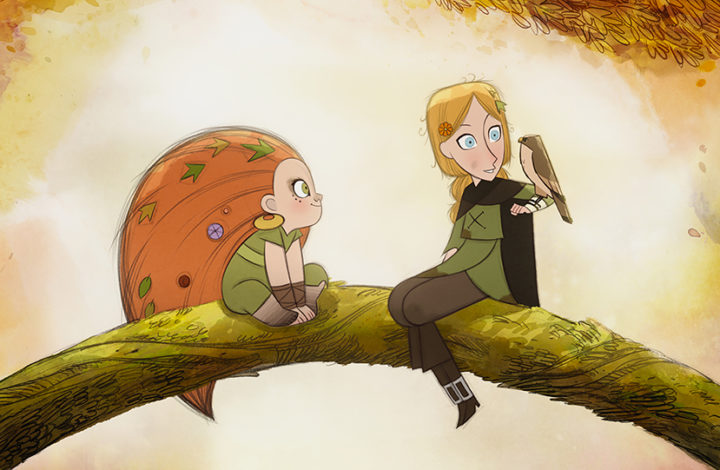
MPAA Rating: PG | Rating: ★★★★
Release year: 2020
Genre: Adventure, Animated, Family, Fantasy Director: Tomm Moore, Ross Stewart
Wolfwalkers, the latest film from Irish animation studio Cartoon Saloon and filmmaker Tomm Moore (here co-directing with Ross Stewart), serves as the finale to a fantastic informal trilogy of films about Ireland’s history and mythology following The Secret of Kells (2009) and Song of the Sea (2014). The first film centered on young Brendan’s medieval and mystical adventures in crafting the Book of Kells, while the second told the magical tale of Ben and his little sister Saoirse (a selkie), and their quest to save the hidden faerie world from a powerful spirit-witch, Macha. Both films are visually-lush fantasy tales filled with Irish folklore and mythology, and in this way, Wolfwalkers follows its predecessors’ paths. Indeed, Wolfwalkers‘ narrative follows almost too closely; the general narrative arc, central characters, and conflicts within Wolfwalkers so strongly parallel Secret of Kells nearly to the point of a kind of self-plagiarism, as if Moore and Co. were telling the same tale over again. Nevertheless, Wolfwalkers‘ animation is so vibrant, its characters so charming, and its themes so relevant that one quickly forgives the more conventional plot points and simply goes along for the thrilling ride with the pack.
Wolfwalkers is set in Kilkenny in 1650 during the terrifying reign/invasion of Lord Protector Oliver Cromwell (voiced with perfect villainy by Simon McBurney), who has ordered that the nearby woods be chopped down to create space for more farmland. Just in this intro alone, the film is tackling the violent Irish-English political history, as well as themes of human-led ecological devastating for economic purposes—a lighthearted “children’s movie” this ain’t. Skilled hunter Bill Goodfellowe (Sean Bean) and his courageous pre-teen daughter Robyn (Honor Kneafsey) have come from England on the Lord Protector’s orders to rid the forest of a roaming wolf pack. Robyn wishes to be a hunter like her father, but is repeatedly told to stay at home to clean house; later, she’s forced to work in the scullery, as this is deemed to be the “proper” work for females. The rebellious Robyn and her pet falcon, Merlin, sneak after Bill into the thick woods, where she encounters the wild-haired Mebh (Eva Whittaker), a spunky Irish girl and a magical “wolfwalker” who both leads a wolf pack, as well as transforms into a wolf while sleeping. The two girls form a friendship out of their mutual adventurous spirits, as well as a respective loneliness as marginalized individuals: Robyn is an English outsider, while Mebh is a “pagan.” Both girls have also lost their mothers—Robyn to death, whereas Mebh’s wolfwalker mother Moll (Maria Doyle Kennedy) remains trapped in slumber, as her wolf-body avatar has not returned from a quest to find a new home for the threatened wolves. Together, Mebh and Robyn must find a way to combat the encroaching English while they also seek a sense of belonging within a community.
Beyond its complex sociopolitical commentary and poignant portrayals of parent-child relationships, what makes Wolfwalkers stand out is its remarkable animation techniques. In a cinematic age where CGI reigns supreme, Wolfwalkers‘ defiant aesthetic in its messy hand-drawn style is at once nostalgic and forward-looking, a beautiful simplicity on the far side of complexity. The colors are vibrant and layered, the character designs both uncomplicated and highly-detailed. A stand-out scene involves Robyn and Mehr running through the woods together—it’s as if we can see every leaf and vine in immaculate detail, even as the actual lines and colors of the drawings are quite minimalistic. What this visual style connotes is an otherworldliness to this historically-laden tale, a childlike rendering which honors some of the darker moments in Ireland’s history with England. It is a fairytale, through and through, and one of the more compelling versions of such stories in recent years. Indeed, Cartoon Saloon has often been compared to Japan’s Studio Ghibli in that both employ sui generis animation styles to tell magical tales of their respective lands and traditions, often with overtly spiritual elements. The comparison is apt and yet insufficient, for Wolfwalkers, Song of the Sea, and The Secret of Kells (as well as The Breadwinner, and even the TV show Puffin Rock) have a unique verve, a bold and brash generosity which comes across as distinctly, wonderfully, perfectly Irish.
IMDB Listing: https://www.imdb.com/title/tt5198068/
Joel. I looked up this review after watching Wolfwalkers and coming away conflicted. I almost always trust your reviews. So I was surprised that you do not mention the controversy about this film in terms of depicting the villain as such a pious Christian even to the point that just before he expires he gives a paraphrase of Luke 23:46 saying “Into your arms, my Lord, I commend my soul.” As I am sure you are aware some Christians were offended by the “bad guy” being so devout (not that he believed in mercy or justice.). I just was curious as to your take on the kerfuffle. Thanks for your good work, Joel.